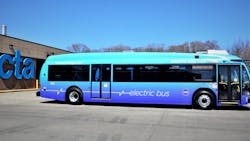RTA of Northern Illinois submits request for $375 million in federal funding to fight climate change
The Regional Transportation Authority (RTA) of Northern Illinois is seeking $375 million in federal grant funding to fight climate change in the Chicago, Ill., region. The project, “Transforming Transit: Accelerating a Zero-Emission Fleet in the Chicago Region,” would allow the Chicago Transit Authority (CTA), Metra and Pace Suburban Bus to purchase and deploy state-of-the-art green technology benefiting riders and residents over four counties, with a focus on communities overburdened by poor air quality and related health effects.
The project was submitted as part of the U.S. Environmental Protection Agency’s Climate Pollution Reduction Grant (CPRG) program, which made $4.6 billion available through competitive implementation grants under the Inflation Reduction Act to fund projects that will reduce regional carbon emissions. The grant also supports a key initiative from the RTA of Northern Illinois’ regional transit strategic plan, Transit is the Answer, to “Accelerate the transition to a zero-emission regional transit system and prioritize communities burdened by poor air quality.” The new buses and trains will allow providers to deliver service that is not only cleaner, but also more reliable and useful for trips throughout the day.
If awarded, the CPRG funding would fund the following investments:
- $125 million for CTA to purchase up to 50 60-foot articulated electric buses and two charging cabinets, supporting up to 40 pantograph chargers to be housed in their 103rd St. bus garage and used on at least two of 25 routes originating in the historic Pullman neighborhood on Chicago’s Far Southeast Side – a historically disadvantaged community and one of the areas of greatest concern for pollution burdens and vulnerability.
- $125 million for Pace to purchase up to 83 electric 40-foot buses to be housed in their North (Waukegan) and Southwest (Bridgeview) Division garages and deployed along 23 routes. Waukegan and Bridgeview are historically disadvantaged communities vulnerable to pollution and air quality issues.
- $125 million for Metra to purchase 32 battery-powered trailer cars and eight docking stations that will allow Metra to retire 16 of its oldest diesel locomotives and add service on three high-ridership lines: Union Pacific North, Milwaukee District West and the Rock Island Beverly Branch. Metra plans to become the first passenger rail provider in the U.S. to introduce battery-electric trains.
RTA of Northern Illinois notes that together, the improvements included in Transforming Transit will reduce carbon dioxide emissions in the transportation sector by a total of 40,568 tons annually once fully implemented. In the near term, the project will result in a 135,506-ton greenhouse gas (GHG) reduction from 2025 to 2030 and a cumulative 402,165-ton GHG reduction from 2025 to 2050. Additionally, the capacity improvements brought to the region by the grant will assist in “mode shift” from single occupancy vehicles to public transit, further enhancing the potential for emission reduction in the region.
“The RTA is proud to lead this regional effort towards reducing emissions,” said Leanne Redden, RTA of Northern Illinois executive director. “Transit is already one of the greenest modes of travel and offers everyone the opportunity to reduce their carbon footprint by foregoing car trips. We are dedicated to working together with CTA, Metra and Pace to transform transit to improve air quality and bring state of the art infrastructure investments to some of our most vulnerable communities and residents.”
In line with the Biden Administration’s Justice 40 Initiative, the RTA of Northern Illinois, CTA, Metra and Pace have committed to prioritizing investments in historically disadvantaged areas, including for improvements that combat climate change, where the operators have aligned their transition to zero- emissions by largely deploying improvements in communities burdened by poor air quality and environmental justice issues first.
CTA, Metra and Pace have each committed to zero-emissions plans for the future of their transit systems.
